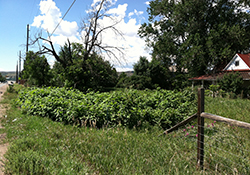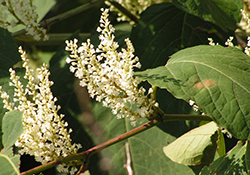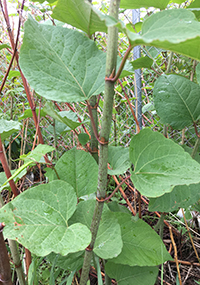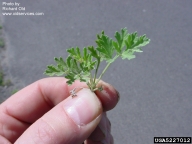Knotweed
Fallopia japonica – Japanese knotweed
Fallopia sachalinense – Giant knotweed
Fallopia x bohemicum – Bohemian knotweed
Keys to Identification
- The leaves are alternate, can be large
- Flowers are small, white, in 4 inch panicles
Family
Polygonaceae – Knotweed family
Other Names
Mexican bamboo
USDA Code
POCU6 – Japanese knotweed
POSA4 – Giant knotweed
POBO10 – Bohemian knotweed
Legal Status
Colorado Noxious Weed List A
Identification
Lifecycle
Perennial
Growth Form
Shrub
Flower
Flowers are greenish-white, â…› inch wide. In upright panicles, 4 inches long
Flowers July-September
Seeds/Fruit
Fruit winged, 3-sided. Seed black, shiny, about â…› inch long
Leaves
Leaves alternate, 3-11 inches wide and 5-15 inches long
Stems
Plants are up to 10 feet tall. Stems hollow, reddish, rigid and jointed
Roots
Rhizomes to 18 feet long
Seedling
Seedlings emerge in April, but can sprout as late as July or August
Impacts
Ecological
Produces allelochemicals from the roots which inhibit the germination of surrounding plants. Forms large thickets that displace native riparian plants
Habitat and Distribution
General Requirements
An escaped ornamental. Found in riparian areas, gardens, disturbed sites and rights-of-way
Distribution
Has been found in Colorado in limited areas
Historical
Native to Asia
Biology/Ecology
Mode of reproduction
Reproduces by seed, rhizomes and vegetatively




